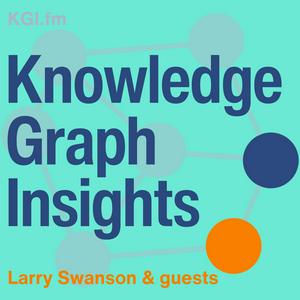Casey Hart: The Philosophical Foundations of Ontology Practice – Episode 38
Casey Hart
Ontology engineering has its roots in the idea of ontology as defined by classical philosophers.
Casey Hart sees many other connections between professional ontology practice and the academic discipline of philosophy and shows how concepts like epistemology, metaphysics, and rhetoric are relevant to both knowledge graphs and AI technology in general.
We talked about:
his work as a lead ontologist at Ford and as an ontology consultant
his academic background in philosophy
the variety of pathways into ontology practice
the philosophical principles like metaphysics, epistemology, and logic that inform the practice of ontology
his history with the the Cyc project and employment at Cycorp
how he re-uses classes like "category" and similar concepts from upper ontologies like gist
his definition of "AI" - including his assertion that we should use term to talk about a practice, not a particular technology
his reminder that ontologies are models and like all models can oversimplify reality
Casey's bio
Casey Hart is the lead ontologist for Ford, runs an ontology consultancy, and pilots a growing YouTube channel. He is enthusiastic about philosophy and ontology evangelism. After earning his PhD in philosophy from the University of Wisconsin-Madison (specializing in epistemology and the philosophy of science), he found himself in the private sector at Cycorp. Along his professional career, he has worked in several domains: healthcare, oil & gas, automotive, climate science, agriculture, and retail, among others. Casey believes strongly that ontology should be fun, accessible, resemble what is being modelled, and just as complex as it needs to be.
He lives in the Pacific Northwest with his wife and three daughters and a few farm animals.
Connect with Casey online
LinkedIn
ontologyexplained at gmail dot com
Ontology Explained YouTube channel
Video
Here’s the video version of our conversation:
https://youtu.be/siqwNncPPBw
Podcast intro transcript
This is the Knowledge Graph Insights podcast, episode number 38. When the subject of philosophy comes up in relation to ontology practice, it's typically cited as the origin of the term, and then the subject is dropped. Casey Hart sees many other connections between ontology practice and it its philosophical roots. In addition to logic as the foundation of OWL, he shows how philosophy concepts like epistemology, metaphysics, and rhetoric are relevant to both knowledge graphs and AI technology in general.
Interview transcript
Larry:
Hi, everyone. Welcome to episode number 38 of the Knowledge Graph Insights podcast. I am really delighted today to welcome to the show Casey Hart. Casey has a really cool YouTube channel on the philosophy behind ontology engineering and ontology practice. Casey is currently an ontologist at Ford, the motor car company. So welcome Casey, tell the folks a little bit more about what you're up to these days.
Casey:
Hi. Thanks, Larry. I'm super excited to be here. I've listened to the podcast, and man, your intro sounds so smooth. I was like, "I wonder how many edits that takes." No, you just fire them off, that's beautiful.
Casey:
Yeah, so like you said, these days I'm the ontologist at Ford, so building out data models for sensor data and vehicle information, all those sorts of fun things. I am also working as a consultant. I've got a couple of different startup healthcare companies and some cybersecurity stuff, little things around the edge. I love evangelizing ontology, talking about it and thinking about it. And as you mentioned for the YouTube channel, that's been my creative outlet. My background is in philosophy and I was interested in, I got my PhD in philosophy, I was going to teach it. You write lots of papers, those sorts of things, and I miss that to some extent getting out into industry, and that's been my way back in to, all right, come up with an idea,


